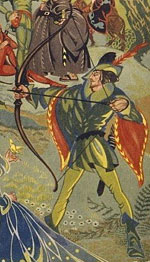Robert Grosseteste and Robin Hood
Introduction by Max Etchemendy
Robert Grosseteste says: "...Your Paternity knows that we refused the lord Robert Passelewe, manager of justice with regard to the forest of the lord the king - who...having often been warned by us that he should desist from the execution of such a duty, being unwilling to obey our warnings – admittance to the aforementioned church, on account of the previously mentioned execution, illicit to him, and very many other causes. In this act, as we believe, in no way ought we to be accused of negligence, but rather to be praised for diligence in our pastoral responsibility."
Charter of the Forest: "All men outlawed merely for [offences against] the forest, from the time of King Henry, our grandfather, to our first coronation, may without interference return to our peace and provide good sureties that hereafter they will commit no offence with regard to our forest."
The Hated Royal Forest System

Robin Hood by Joyce Merier
Lesson on the Magna Carta, the sister document to the Charter of the Forest
Although the Magna Carta was very important to the members of the upper class, we cannot forget that medieval England was an agricultural society. Everyday life was dominated by tasks such as growing food, caring for livestock, and gathering firewood. This is why folks lower in the social hierarchy might well care even more about the protections established in the Charter of the Forest, sealed in 1217 by John’s successor, King Henry III.
In order to understand the significance of this document, it is necessary to know a bit about the royal forest system. After the Normans conquered Anglo-Saxon England in 1066, the new kings declared certain areas to be royal forests. In these forests, a special set of laws applied, designed to protect the king’s exclusive hunting rights.
This meant that no one could hunt (or even carry weapons appropriate for hunting) in the forests without permission. Even heavier restrictions were put in place in order to protect the game animals’ habitat (or “vert”). These laws limited ordinary people’s freedom to take firewood, graze animals, and even enclose crops.1
The penalties for disobedience could include fines, corporal punishment, or death. Matthew of Paris reports a royal bailiff who brought even noble families to financial ruin for taking a single deer without permission. Forest wardens were also famously corrupt, sometimes extorting illegally from forest dwellers.2
Champions of Protest Against the Forest System
It is no wonder that the Anglo-Saxon Chronicle reports that rich and poor alike bitterly hated the forest system. Nor is it a surprise that Robin Hood, the folkloric outlaw and champion of the people, is often portrayed as violating the forest law and protecting those who would be punished for doing the same. It is easy to imagine that common people in the twelfth, thirteenth, and fourteenth centuries sympathized with outlaws who thumbed their noses at the king’s foresters.
Robert Grosseteste’s letter gives you a sense of the anger people felt against the forest system. He refused to install the royal forester Robert Passelewe to a clerical living at the church of Northampton, because his “illicit function” disqualified him to provide pastoral care. Passelewe was (predictably) hated for his zealous service as a forester,3 but Grosseteste seems especially upset that he had punished both clerics and laypersons indiscriminately.
Reforms Introduced by the Charter of the Forest
Naturally the barons who forced the Great Charter (Magna Carta) upon King John took the opportunity to make the king limit the severity of the forest law. The Charter of the Forest, sealed after John’s death by his son (who was still a child at the time, though king), banned corporal or capital punishment for killing deer in the forest without permission. Those who owned land in the forests were allowed more freedom to build and cultivate. Protections were put in place to prevent the foresters’ abuses. And the Charter also removed some lands from the royal forests.
Of course, the Charter of the Forest hardly ended the ongoing tension over the forest system (Grosseteste’s letter, for example, comes decades after the Charter went into effect), but it did allow some additional freedoms to the forest dwellers.
Bibliography
Raymond Grant. The Royal Forests of England. Wolfeboro Falls, NH: Alan Sutton, 1991.
1. Grant pp. 6.
2. Grant pp. 104.
3. Grant pp. 146.